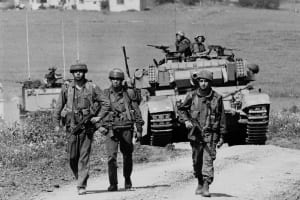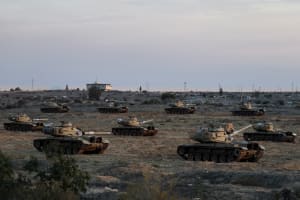'The Friend' - Insights on Orde Wingate, father of the IDF, from the British archives

The survival tactics of the Jewish state and its military prowess can be largely traced back to one man, a Christian Zionist British officer.
Much has been written about Colonel Orde Charles Wingate, but in Israel, he is known as the father of Israel Defense Forces, or simply as ‘Ha Yedid’ – The Friend.
“The IDF’s foundational military doctrine, taught to its earliest soldiers by Wingate, a decade before Israel’s resurrection as a state, is pre-emption,” wrote Israeli tour guide and veteran journalist, Stan Goodenough.
“Because the land of Israel is so tiny, lacking any strategic depth, the battle must be taken to the aggressors on their land; they must not be allowed to cross the borders and engage the IDF inside Israel."
“Israel’s stupendous Six-Day War victory was secured by employing this doctrine. In that sense, the Hamas assault on October 7 provided a - relatively small - example of what would happen if the Jewish state waited to be invaded by a Lebanese or Iranian or any other force,” Goodenough said.
During the British Mandate for Palestine, from 1920 to 1948, and following the San Remo conference – which put Great Britain legally in charge of the reconstitution of a Jewish homeland within its biblical borders – the British personnel and the Palestinian Jews were subject to violent opposition from Arab forces.
This period is known as the Arab Revolt (1936-1939), although the Mufti of Jerusalem had been inciting local Arabs to revolt against the Jews from 1920 onwards.
Wingate arrived in Mandate Palestine as a junior intelligence officer, just as the Arabs were rioting in huge numbers against vital infrastructure, such as the Iraq-Haifa oil pipeline. The British were losing control of the situation.
Having been raised in a staunchly biblical family, the young soldier found that he had an affinity for the Hebrew language, and was zealous about God’s promises for the Jewish nation and her regathering in fulfillment of prophecy.
Wingate, whose biblical hero was Gideon, was a breath of fresh air for the Jewish pioneers. His attitude was opposite to that of the Arabist British military administration on the ground.
He recognized the need for the besieged Jewish communities to be trained on how to defend themselves, even as his army superiors were denying Jews weapons as part of a policy of appeasement in the face of Arab violence.
Wingate pioneered the concept of engaging the enemy directly, rather than remaining the sitting ducks that the unarmed Jewish farmers had been up until that point. His sharp intuition and groundbreaking strategies meant the oil pipeline was ultimately saved, and the British Mandate could continue for another decade.
In a secret government file that remained sealed until 1993, decisions about the future life and career of Major-General (as he became) Orde Wingate can be found in print.
Wingate was ousted from pre-state Israel early in 1939, despite his military successes against Arab terrorism, merely because he was considered too “pro-Jew” in the eyes of his superiors.
“Wingate’s activities in Palestine in 1938 in operating special night squads composed of Jews made him fanatically pro-Jew,” wrote General Alexander, then commander-in-chief of the Palestine Regiment, in a ‘most secret’ cipher telegram dispatched on Oct. 3, 1942, and received the following day. This telegram is marked in pencil, ‘NOT TO BE PLACED ON THE FILE.’
Alexander continued: “Early in 1939, General Haining had him transferred home on account of his attitude.”
“Fanatically pro-Jew.” This was the reason given to refuse even Winston Churchill his wishes, which had been expressed in September 1942, in response to Jewish Agency appeals to have Wingate reinstated.
“This Officer’s services should be made available. Pray take steps to implement and report to me,” said Britain’s wartime prime minister.
Churchill wanted to act on the request of Dr. Chaim Weizmann, [who would become Israel’s first president] then head of the Jewish Agency, sent to the Secretary of State for the Colonies Viscount Cranborne on July 4, 1942, that Wingate be the man to command the first national Jewish army since biblical times.
“It is obvious that a man is necessary who knows the country and our people, and who has shown special aptitude for that kind of work. There is one man who has all these qualities and qualifications in the highest degree: Colonel Orde Wingate, D.S.O. [Distinguished Service Order] (he received the D.S.O. when commanding Jewish auxiliaries during the Palestine riots, and a bar to it in Abyssinia last year).
“He has the implicit confidence of all our people and knows how to handle them; he speaks both Hebrew and Arabic. At present, he is in India, connected with G.H.Q. Delhi. Mr. Amery knows him well personally, and I believe that his is also known to the Prime Minister.”
Leo Amery, one of the pro-Jewish members of the British government, left over from the 1920s – when a largely Christian First World War Cabinet approved the Balfour Declaration in 1917 – was by now in charge of the India Office in London. Although he preferred to keep Wingate engaged in his valuable job against insurgents in the East, he admitted that Wingate would certainly be the best candidate to lead the Jewish army.
“I don’t know if you know anything about Wingate, but he is one of the most remarkable young men of the day: another Lawrence, but more virile and sane,” Amery wrote to Cranborne, on July 3, 1942.
“In the Arab troubles some years ago he organised Jewish mobile forces with immense success and his is absolutely adored by all the Jews of Palestine - talks Hebrew and all the rest of it. I was so impressed by his personality that when Italy came into the war I got the War Office to send him to Abyssinia where he commanded all the irregular forces … made some 10,000 Italian troops surrender to himself and 130 men. Subsequently, I got [General] Wavell to ask for him in India, where he is now Chief Instructor in guerrilla warfare."
“I shouldn’t like to lose him from India, but on the other hand the Palestine situation is more urgent and if it comes to a last desperate showdown there he can do more than any other man to save the situation. If we are driven out of Egypt and back upon Palestine it may well be that the Jews will be the only element we can rely upon. Anyhow, it may be as well to get Wingate flown to Palestine and begin organising such Jewish levies as he can.”
Even before this invaluable insight, Cranborne acknowledged in a 'Most Secret' telegram on June 26, 1942, to the political chief on the ground, High Commissioner Sir Harold MacMichael, that Palestinian Jews required better equipment and defenses in the face of the escalating Arab onslaught.
“In view of the unfavourable turn which military situation in Middle East has taken in the last few weeks, I think it would be advisable to review once more the position of local defence organisations in Palestine, with particular reference to arming, training and equipment of Jeiwsh Settlement Police and other police formations for functions analogous to those performed by Home Guard in this [UK] country…"
“...in view of all the circumstances I suggest that you should represent urgently to G.O.C. [General Officer Commanding] importance of rapid arming and training of all Jewish police formations…”
However, following General Alexander's assessment, the hopes of Weizmann, Amery, Churchill and Wingate himself, were dashed. After the "fanatically pro-Jew" line, Alexander continued:
“I am satisfied that his presence in Palestine at present time is highly undesirable and I request most strongly that the idea be dropped.” And the next sentence was added in to the final letter: “He would undoubtedly raise the political barometer…”
And so we have it: While the military chiefs were reluctant to involve the politicians in their decision about Wingate – citing military priorities – in the end, it was all about politics.
Then-British Defense Secretary Sir James Grigg wrote to Maj.-Gen. Hastings Ismay at the War Office in London: “In the fact of these very strong views and of the very delicate situation in Palestine, neither the Colonial Secretary nor I think it feasible to order General Alexander to find some employment for him [in command of Jews] in [Palestine] that area.” (The words in square brackets were deleted from the first draft.)
Grigg continued: “Moreover I think that at this particular time, General Wavell might have legitimate cause for complaint if Wingate were taken away from the very important work he is doing on the Assam-Burma frontier. We hope, therefore, that the Prime Minister will agree not to press his request.”
After this concerted military and political campaign was waged in the corridors of power, against the ‘friend of the Jews,’ even the bullish, determined Churchill acquiesced.
Ismay wrote to Grigg on Oct. 24, 1942: “I submitted your letter of 20th October, 1942, to the Prime Minister who has initialled it. From this, I infer that he does not wish to press his request that the services of Col Orde Wingate should be made available in the Palestine Regiment.”
While Adolf Hitler and his Holocaust campaign was raging in Europe, the Jewish request for their own army, and an able leader was declined by the Mandate power legally bound to their national survival. Tragically, their friend – who insisted on simply being called ‘Orde’ by the soldiers he trained – was killed at the age of 41 while on active duty in Burma.
Eighty-two years later, despite a very strong army that arose as the ‘dry bones’ from the death camps, Israel has now witnessed a smaller Holocaust on its own soil, and Wingate’s tactics are more essential than ever.
“Humanly speaking,” says Goodenough, “unless Israel retains the initiative – it will not survive. There will be no second chance.”

The All Israel News Staff is a team of journalists in Israel.
You might also like to read this:














